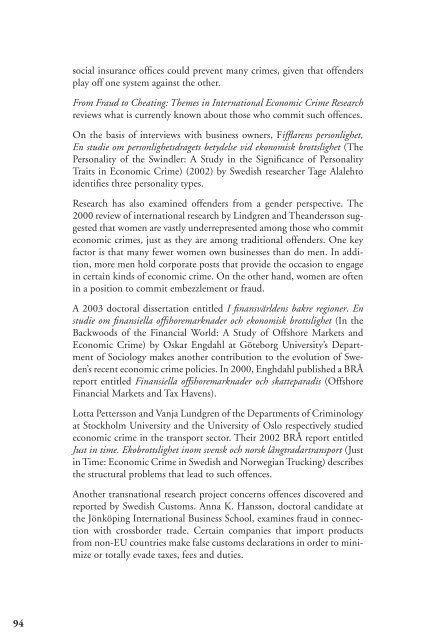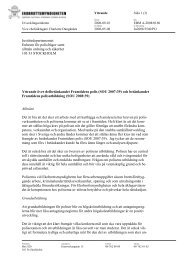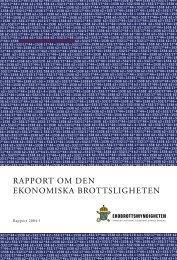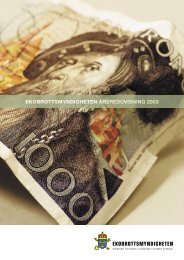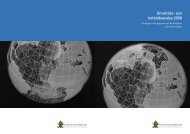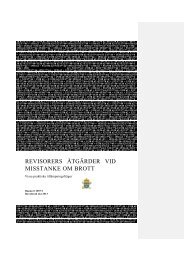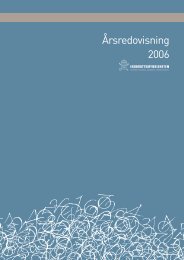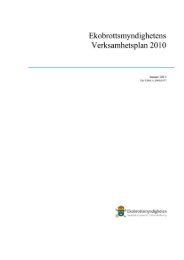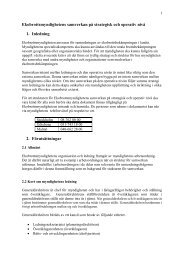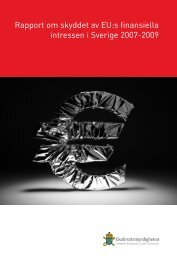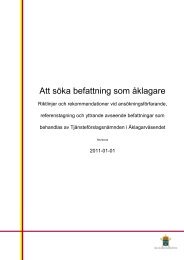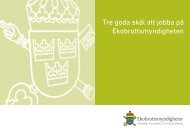Economic crime report 2004 - Ekobrottsmyndigheten
Economic crime report 2004 - Ekobrottsmyndigheten
Economic crime report 2004 - Ekobrottsmyndigheten
Create successful ePaper yourself
Turn your PDF publications into a flip-book with our unique Google optimized e-Paper software.
social insurance offices could prevent many <strong>crime</strong>s, given that offenders<br />
play off one system against the other.<br />
From Fraud to Cheating: Themes in International <strong>Economic</strong> Crime Research<br />
reviews what is currently known about those who commit such offences.<br />
On the basis of interviews with business owners, Fiffl arens personlighet,<br />
En studie om personlighetsdragets betydelse vid ekonomisk brottslighet (The<br />
Personality of the Swindler: A Study in the Significance of Personality<br />
Traits in <strong>Economic</strong> Crime) (2002) by Swedish researcher Tage Alalehto<br />
identifies three personality types.<br />
Research has also examined offenders from a gender perspective. The<br />
2000 review of international research by Lindgren and Theandersson suggested<br />
that women are vastly underrepresented among those who commit<br />
economic <strong>crime</strong>s, just as they are among traditional offenders. One key<br />
factor is that many fewer women own businesses than do men. In addition,<br />
more men hold corporate posts that provide the occasion to engage<br />
in certain kinds of economic <strong>crime</strong>. On the other hand, women are often<br />
in a position to commit embezzlement or fraud.<br />
A 2003 doctoral dissertation entitled I fi nansvärldens bakre regioner. En<br />
studie om fi nansiella offshoremarknader och ekonomisk brottslighet (In the<br />
Backwoods of the Financial World: A Study of Offshore Markets and<br />
<strong>Economic</strong> Crime) by Oskar Engdahl at Göteborg University’s Department<br />
of Sociology makes another contribution to the evolution of Sweden’s<br />
recent economic <strong>crime</strong> policies. In 2000, Enghdahl published a BRÅ<br />
<strong>report</strong> entitled Finansiella offshoremarknader och skatteparadis (Offshore<br />
Financial Markets and Tax Havens).<br />
Lotta Pettersson and Vanja Lundgren of the Departments of Criminology<br />
at Stockholm University and the University of Oslo respectively studied<br />
economic <strong>crime</strong> in the transport sector. Their 2002 BRÅ <strong>report</strong> entitled<br />
Just in time. Ekobrottslighet inom svensk och norsk långtradartransport (Just<br />
in Time: <strong>Economic</strong> Crime in Swedish and Norwegian Trucking) describes<br />
the structural problems that lead to such offences.<br />
Another transnational research project concerns offences discovered and<br />
<strong>report</strong>ed by Swedish Customs. Anna K. Hansson, doctoral candidate at<br />
the Jönköping International Business School, examines fraud in connection<br />
with crossborder trade. Certain companies that import products<br />
from non-EU countries make false customs declarations in order to minimize<br />
or totally evade taxes, fees and duties.<br />
94


